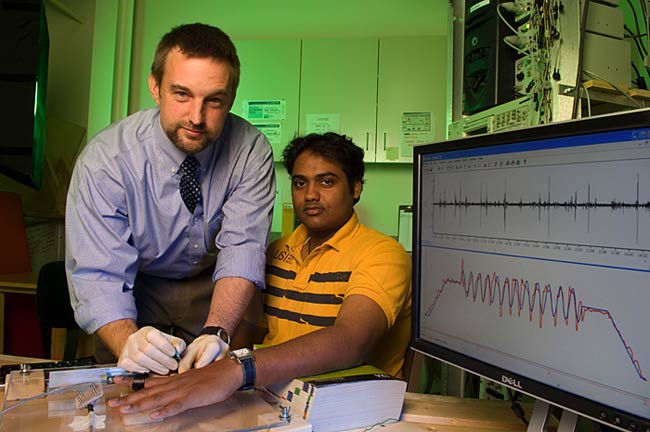Aging Muscles Become Hard of Hearing

As people age, neurons have to yell louder at the body's muscles to whip them into action, according to a new study, but exercise could reverse the aging effect.
Researchers examined the relationship between neuron activity and corresponding muscle force for 23 subjects between the ages of 18 and 88. They found a diminished ability of the muscles to respond to the commands of neurons amongst the older participants.
Specifically, the researchers looked at the dorsal interosseous muscle, situated between the index finger and thumb. This muscle is activated by 120 individual neurons. Each subject had a small needle-like electrode inserted into their index finger. The electrode was hooked up to a computer which recorded the electrical impulses as they traveled from the neurons to the muscle fibers.
The participants were asked to use that finger to follow the outline of a wavy line with peaks and valleys on a computer screen.
"More force--which this indicated by a corresponding higher firing rate of neurons--is exerted just before you begin the upturn toward one peak and then it eases off again in the downturn toward a valley," said Christopher Knight, a researcher from the University of Delaware.
The tests showed neuron firing rates and muscle responsiveness were lower in older participants than the younger subjects.
"The repeated contraction of muscles is essential to movements such as walking," Knight said. "However, our muscles have a reduced capacity to contract or 'twitch' as we grow older. We lose fast-twitch muscle fibers as we age."
Get the world’s most fascinating discoveries delivered straight to your inbox.
This type of reduced neuron activity, Knight said, could be improved however with exercising.
"After power training with weights, we see an increase in firing rates," Knight said. "For safety, we're commonly advised to do things slowly when exercising, but it's important to also do some fast exercises. You need a fast movement to prevent a fall. Even in the frail elderly, it is possible to use exercise bands for manual resistance to improve the speed of movement."
The study was detailed in the January issue of the Journal of Applied Physiology.
 Live Science Plus
Live Science Plus






